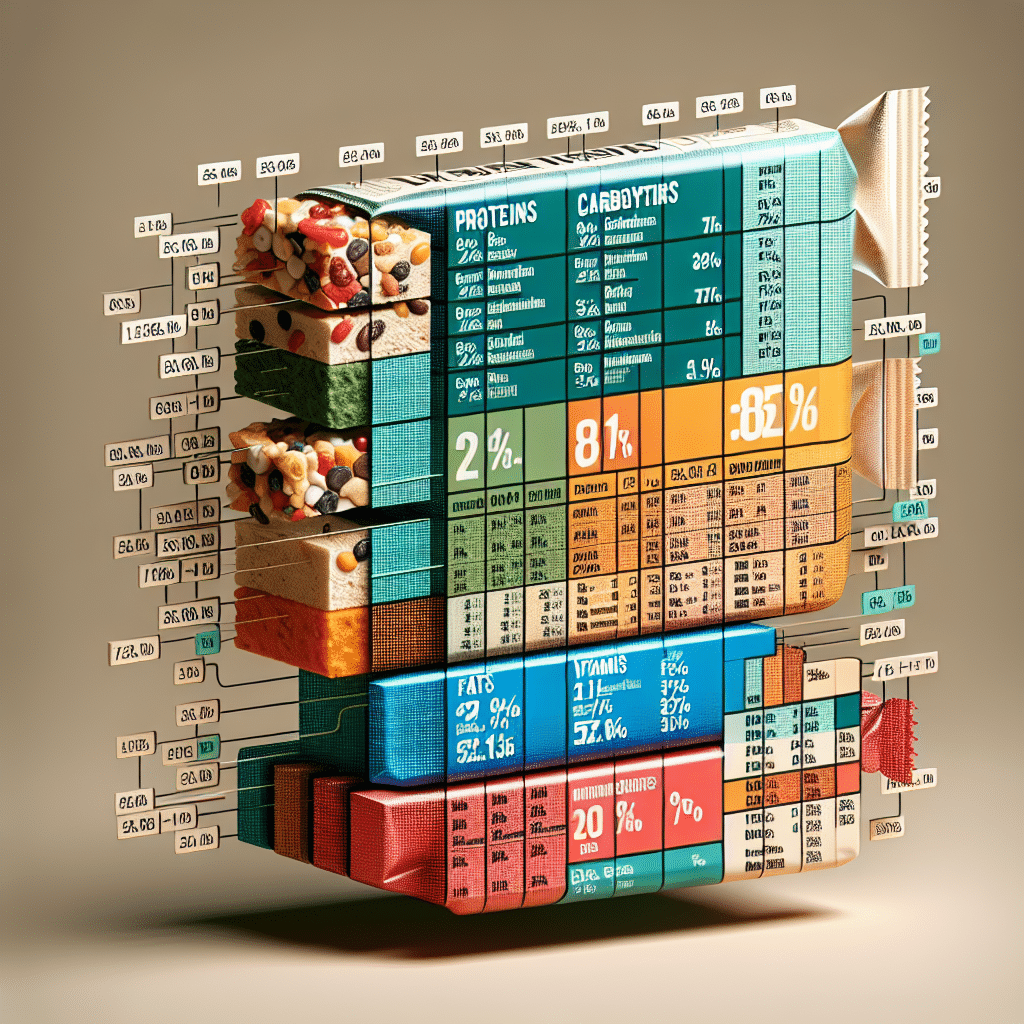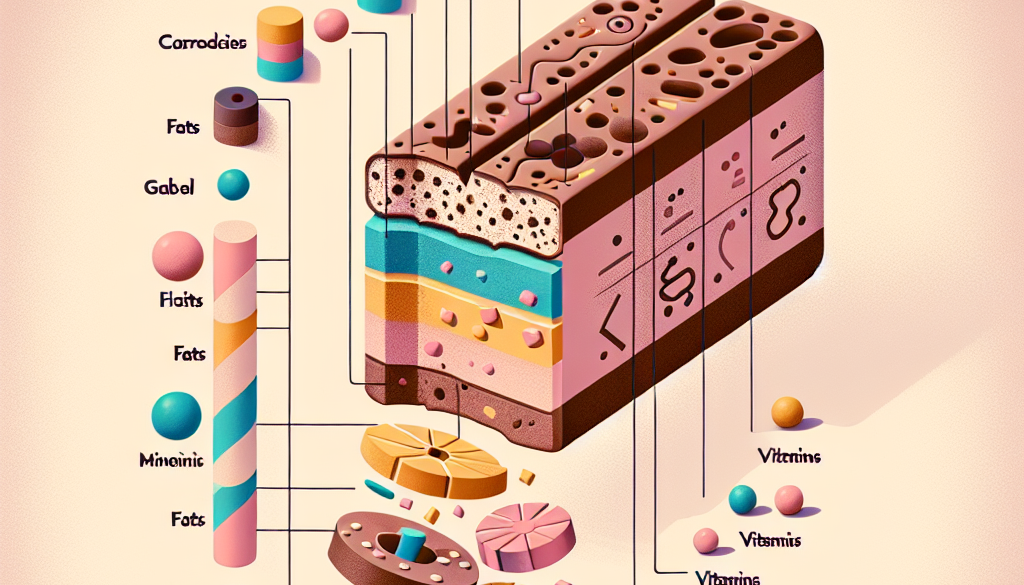Protein Bar Nutrition: Unwrapping The Nutritional Content
-
Table of Contents
- Protein Bar Nutrition: Decoding the Nutritional Value
- Understanding Protein Bar Ingredients
- Protein Content and Quality
- Carbohydrates and Fiber
- Fats: The Good and the Bad
- Vitamins and Minerals
- Added Sugars and Artificial Ingredients
- Caloric Content: Balancing Diet and Goals
- Case Studies and Statistics
- Choosing the Right Protein Bar
- Conclusion: The Takeaway on Protein Bar Nutrition
- Discover ETprotein’s High-Quality Protein Products
Protein Bar Nutrition: Decoding the Nutritional Value

Protein bars have become a staple in the diet of many health-conscious individuals. They are convenient, portable, and come in a variety of flavors, making them an attractive option for those looking for a quick protein fix. However, not all protein bars are created equal, and understanding their nutritional content is crucial for making informed choices. In this article, we’ll unwrap the nutritional content of protein bars and provide insights into what makes a protein bar beneficial or detrimental to your health goals.
Understanding Protein Bar Ingredients
Protein bars can vary significantly in their composition. The primary ingredient, as the name suggests, is protein, which can come from various sources:
- Whey protein
- Casein protein
- Soy protein
- Pea protein
- Rice protein
- Hemp protein
Aside from protein, these bars often contain carbohydrates, fats, vitamins, minerals, and various additives for flavor, texture, and preservation. Let’s delve into the nutritional aspects of these components.
Protein Content and Quality
The amount of protein in a bar can range from 10 to 30 grams. High-quality protein bars will often use complete proteins that contain all nine essential amino acids. For example, whey and casein are complete proteins derived from milk, while plant-based options like soy, pea, and rice can be combined to ensure a full amino acid profile.
Carbohydrates and Fiber
Carbohydrates are another key component, with amounts varying from low to high. Some bars are designed to be low-carb, while others are packed with sugars for energy. Fiber content is also important, as it can aid digestion and provide a sense of fullness. Look for bars with natural sources of fiber like oats, nuts, and seeds.
Fats: The Good and the Bad
Fats in protein bars come from nuts, seeds, or oils. While some bars contain healthy unsaturated fats, others may have saturated fats or trans fats, which should be consumed in moderation. The type and amount of fat contribute to the overall caloric content of the bar.
Vitamins and Minerals
Many protein bars are fortified with vitamins and minerals to enhance their nutritional profile. These can include calcium, iron, potassium, and various B vitamins. However, it’s important to consider whether you need these added nutrients based on your overall diet.
Added Sugars and Artificial Ingredients
Some protein bars contain high levels of added sugars and artificial ingredients, which can detract from their health benefits. It’s essential to read the label and choose bars with low added sugars and minimal artificial sweeteners, colors, or preservatives.
Caloric Content: Balancing Diet and Goals
The caloric content of protein bars can vary widely, typically ranging from 150 to 400 calories per bar. When selecting a protein bar, consider your dietary needs and fitness goals. If you’re using a protein bar as a meal replacement, a higher calorie count may be appropriate. However, if it’s a snack, a lower-calorie option might be better.
Case Studies and Statistics
Research has shown that consuming protein bars can have various effects on health and fitness goals. For example, a study published in the “Journal of the International Society of Sports Nutrition” found that consuming a protein bar after a workout can aid in muscle recovery and growth. Additionally, statistics indicate that the global protein bar market is growing, with an increasing demand for healthier snack options.
Choosing the Right Protein Bar
When selecting a protein bar, consider the following factors:
- Protein source and amount
- Carbohydrate and fiber content
- Types of fats and their amounts
- Presence of added sugars and artificial ingredients
- Caloric content in relation to your dietary needs
- Fortification with vitamins and minerals
By analyzing these factors, you can choose a protein bar that aligns with your health and fitness goals.
Conclusion: The Takeaway on Protein Bar Nutrition
Protein bars can be a convenient and effective way to supplement your diet with additional protein and other nutrients. However, it’s crucial to understand the nutritional content of these bars to ensure they fit within your dietary goals. By choosing bars with high-quality protein, balanced macronutrients, and minimal added sugars and artificial ingredients, you can enjoy the benefits of protein bars without compromising your health.
Discover ETprotein’s High-Quality Protein Products
If you’re looking for premium protein sources to complement your diet, consider ETprotein’s range of organic and plant-based proteins. Their products are designed to meet the needs of various industries, including sports nutrition and health and wellness. With a commitment to non-GMO, allergen-free ingredients, ETprotein offers a variety of protein powders and supplements that cater to your specific requirements.
About ETprotein:
ETprotein, a reputable protein Chinese factory manufacturer and supplier, is renowned for producing, stocking, exporting, and delivering the highest quality organic bulk vegan protein and plant proteins. They include Organic rice protein, clear rice protein, pea protein, clear pea protein, pumpkin seed protein, sunflower seed protein, mung bean protein, peanut protein etc. Their offerings, characterized by a neutral taste, non-GMO, allergen-free attributes, cater to a diverse range of industries. They serve nutraceutical, pharmaceutical, cosmeceutical, veterinary, as well as food and beverage finished product distributors, traders, and manufacturers across Europe, USA, Canada, Australia, Thailand, Japan, Korea, Brazil, and Chile, among others.
ETprotein specialization includes exporting and delivering tailor-made protein powder and finished nutritional supplements. Their extensive product range covers sectors like Food and Beverage, Sports Nutrition, Weight Management, Dietary Supplements, Health and Wellness Products, and Infant Formula, ensuring comprehensive solutions to meet all your protein needs.
As a trusted company by leading global food and beverage brands and Fortune 500 companies, ETprotein reinforces China’s reputation in the global arena. For more information or to sample their products, please contact them and email sales(at)ETprotein.com today.














